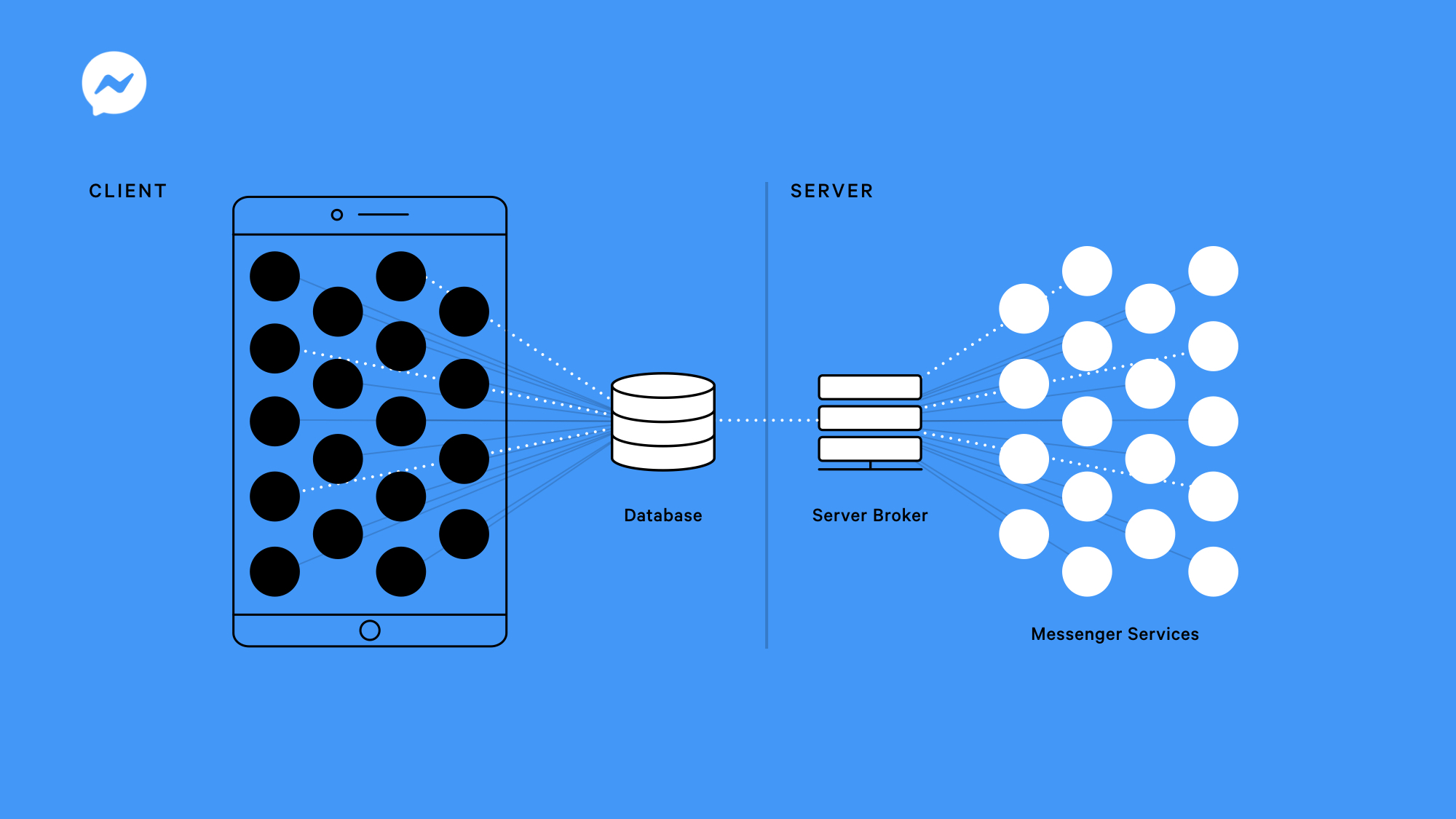
To make Messenger faster, smaller, and simpler, we started from the ground up with a new client core and server framework. We’ve advanced our own state-of-the-art technologies and rewritten the codebase to be sustainable and scalable for the next decade. https://t.co/Q0Oy4XlNE6
— Facebook Engineering (@fb_engineering) March 2, 2020
I'm glad Messenger is faster.
— Alex Kantrowitz (@Kantrowitz) March 2, 2020
Now Facebook should get to work on a more important improvement: allowing you to delete your messages en masse, and giving you a disappearing messages option. https://t.co/RMxox1aIni
The new Facebook Messenger for iOS is much faster and takes less space on your phone https://t.co/NQq45uuSsE pic.twitter.com/7nWXDiQeWS
— The Verge (@verge) March 2, 2020
iOS용 페이스북 메신저 앱이 완전히 리뉴얼, 업데이트됨. 2012년 8.7메가였던 이 앱은 업데이트와 함께 130메가에서 30메가로 줄어들었고 코드도 170만줄에서 36만줄로 84% 줄임. https://t.co/Yzml4eK1lP
— 푸른곰 (@purengom) March 2, 2020
The Facebook engineering blog goes into detail about the smaller, faster, Messenger.
— Ben Sandofsky (@sandofsky) March 2, 2020
This section seems to say, “We don’t use React Native,” without explicitly saying it.https://t.co/JhOCW9oiB4 pic.twitter.com/RsrAwvzWEy
Reading between the lines here, sounds like the new FB Messenger app completely ditched React Native?
— Mengxi Lu (@mengxilu) March 2, 2020
"... we reduced core Messenger code by 84 percent, from more than 1.7M lines to 360,000."
"... using the native OS wherever possible"https://t.co/IAzKdVrgTt
Facebook made their Messenger twice as fast. How? As native as possible. No React Native, not even third party library abstractions:https://t.co/5RUukQp4YT pic.twitter.com/4mwMQeAfUZ
— Benedikt Terhechte (@terhechte) March 2, 2020
What Facebook didn't tell you, is that MSYS will be the core technology for powering end-to-end encrypted communication across Facebook products, including Instagram and WhatsApp
— Jane Manchun Wong (@wongmjane) March 2, 2020
https://t.co/3sH1cL6yqs
Interesting https://t.co/rVtmr3dkZ7
— Ŧʟᴀᴠɪᴏ (@flaviocopes) March 2, 2020
Facebook’s engineering team explain how it made Messenger faster, smaller, and simpler... https://t.co/BSSLnxnaU2
— Matt Navarra (@MattNavarra) March 2, 2020
"For any cross-platform logic, we used an operating extension built in native C code, which is highly portable, efficient, and fast"
— Marcin Krzyzanowski (@krzyzanowskim) March 2, 2020
Now I'm highly confused with FB engineering. Didn't they just sell JavaScript with ReactNative as a too for that?https://t.co/HNCWlgI9ft
_Even_ Facebook are realising how much better writing native code is https://t.co/qKIVGOs1lh
— Tim Condon (@0xTim) March 2, 2020
Facebook discovers UIKit:
— Yichen Cao (@schemetrical) March 2, 2020
“The native frameworks don’t have to be translated into sub-frameworks.“
“Rather than reinventing the wheel, we used the UI framework available on the device’s native OS to support a wider variety of application feature needs.”https://t.co/iOeswyCNCx
The new Facebook Messenger for iOS is much faster and takes less space on your phone https://t.co/Mf1eIJNERf pic.twitter.com/9PyqgMCiUJ
— The Verge (@verge) March 3, 2020
"With LightSpeed, the company [Facebook] found that it could replace much of this functionality with the widely used SQLite open-source database. 'We made a
— Markus Winand (@MarkusWinand) March 3, 2020
bigger bet on it,' says Agsen. 'Things we would have done in memory, we put in a database.'"https://t.co/P9dWx0cY6i
Had the chance briefly to work on this with my lovely team over the summer! Excited to see it finally roll out today.
— Devansh (@madebydevansh) March 3, 2020
https://t.co/pN1PLDh0N9
Really amazed at this effort, and excited for what we'll build on this foundation.https://t.co/bs8aKgjx6D
— Chris Slowik (@chrisslowik) March 2, 2020
Did Facebook just kill off React Native? Either way, it's funny that I actually agree. We write all our hybrid shells with the native platform tooling (and then fill them with server-rendered HTML using Turbolinks!). Full control to level up UI to native. https://t.co/EVUPTe4O4Q
— DHH (@dhh) March 3, 2020
1. The Messenger team published a blog post about the rewrite of their native app. It’s really cool, you should check it out. https://t.co/nk6NrQu01E
— Dan Abramov (@dan_abramov) March 3, 2020
"The new Facebook Messenger is twice as fast to start and is one-fourth the size"
— Felix Krause (@KrauseFx) March 3, 2020
"We accomplished this by using the native OS wherever possible (...)"
Yah surprisehttps://t.co/V6oFKrFO6q
Today’s Messenger is significantly lighter — the codebase has shrunk from 1.7M+ lines to 360,000. The app’s binary size is now one-fourth what it was. We also built a system that allows us to understand how much binary weight each feature is bringing in.https://t.co/4BNXZKJ125
— Agis Tsaraboulidis (@agisilaosts) March 3, 2020
"The new Facebook Messenger is twice as fast to start and is one-fourth the size... We accomplished this by using the native OS wherever possible"https://t.co/9Tj2aACjDX https://t.co/01we411PDA
— Saket Narayan (@Saketme) March 3, 2020
Why Facebook agrees that #ReactNative is garbage:
— TechLead (@techleadhd) March 3, 2020
"While UI frameworks can be powerful and increase developer productivity, they require constant upkeep and maintenance to keep up with the ever-changing mobile OS landscape..." https://t.co/mvVKtGY3SK
Great read on Facebookre-writing the iOS messaging app. "Messenger is twice as fast to start* and one-fourth the size." https://t.co/tLmXtVs6Qp #iOSDev #Swift
— Lee Burrows (@TheiOSDude) March 3, 2020
Very frustrating to see web teams bragging about programming the way we told them to back when they were constantly claiming native coders were wrong about how to program. You could have just listened and done this 10+ years ago? #FUSVhttps://t.co/BVrrs1a705
— Casey Muratori (@cmuratori) March 3, 2020
FacebookがMessengerアプリを0から書き直したらしい。コード量84%減、バイナリサイズは4分の1、スピードは2倍とのこと。すごいhttps://t.co/phrVcEAeW9
— みやざき (@zaki_prog) March 3, 2020
Project LightSpeed: Rewriting Messenger to be faster, smaller, and simpler https://t.co/Mg2xFV5JK7 pic.twitter.com/nDHSsED7HJ
— Quentin '?' ADAM (@waxzce) March 3, 2020
.png)